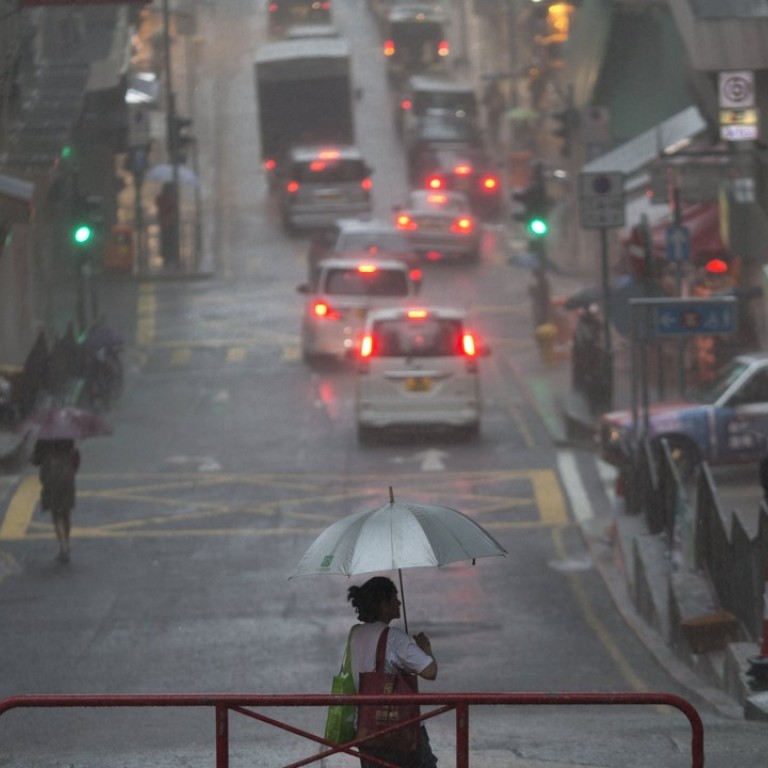
Letters to the Editor, June 1, 2017
Earlier red rain warning was not justified
The letter raised the issue of the red rainstorm warning on May 24 and whether it could have been issued earlier, preferably before 8am.
I would like to explain the situation that morning. Before 6am, although only scattered showers were affecting Hong Kong, the Observatory predicted that the rain areas in the vicinity of the Pearl River Estuary would generally intensify. The public was alerted at 5.55am of the potential of widespread heavy rain.
The amber rainstorm warning signal was issued at 6.40am, meaning that heavy rain had fallen or was expected to fall generally over Hong Kong, exceeding 30mm in an hour, and was likely to continue. While the rain continued, the criterion for issuing the red rainstorm warning was not met before 8am and still not so before 9am.
Noticing, however, that rain was particularly heavy in certain districts, such as Kwai Tsing, Sham Shui Po and Sha Tin, we issued the announcements on localised heavy rain from 7.25am to alert the public of serious flooding due to heavy rain in those districts and the need to take precautionary measures.
The heavy rain spread to more regions at around 9am and we issued the red rainstorm warning signal at 9.15am. With the approach of another rainband towards Hong Kong, rain over the territory intensified further and we issued the black rainstorm warning signal at 11.30am, which lasted for one hour.
The Observatory accords the highest priority to the safety of Hong Kong people and safeguards the public through science. We will continue to liaise closely with different government departments to better serve the community.
Lee Lap-shun, senior scientific officer, Hong Kong Observatory
Teacher sets an example, but not for all
I hope it will encourage more youngsters to get out and start hiking on the trails in our country parks.
However, while what she did will hopefully inspire young people to follow their dreams, I doubt if many of them will actually want to follow in her footsteps.
Following your goal to be a doctor, lawyer or accountant is one thing, but Ada Tsang was doing something that was very dangerous and where the cost of failure can be high. She encountered one climber who was dying.
I respect what Tsang achieved as a mountaineer, but I would not recommend that young people literally follow in her footsteps.
Edmond Pang, Fanling
Bank lending for mainland is a concern
Hong Kong’s Financial Secretary Paul Chan Mo-po is correct to say that Hong Kong has sound economic fundamentals. It has a robust financial regulatory regime, resilient banking sector and strong fiscal position.
But ratings agency Moody’s may have some reasons for downgrading Hong Kong.
Mr Chan must know that too many Chinese firms are raising a lot of funds in Hong Kong. Not only this, but too many Hong Kong firms borrow money from Hong Kong banks and invest on the mainland, and this worries Moody’s.
What will happen if banks in Hong Kong are not able to recover the money they have lent for investments in China?
Gary Ahuja, Tsim Sha Tsui
Primary school stress can ruin childhood
A recent survey in Britain has found that primary students sitting national tests suffered increasing levels of stress.
As a Hong Kong student I was not shocked by this news and I totally understand how they feel.
There is a sickening trend in our society where students are told that their priority is to get higher marks.
At primary level, children are still very young and lack maturity. It is cruel to push them like this and force them to be competitive. They should be allowed to enjoy their childhood, but so often this does not happen.
There has to be a change of mindset in society. Children should not be measured just by their academic results.
They need to be allowed to develop without this kind of pressure being imposed on them all the time. As I said, they should be given the chance to have a carefree childhood.
Kiki Chan Ka-kei, Yau Yat Chuen
Game apps have an edge over textbooks
A mobile phone app has been developed by Finnish studio Lightneer to teach science to youngsters in a fun and engaging way.
I think game apps can be used to increase the learning efficiency of children.
It can help them to learn more about subjects such as particle physics, biology or mathematics. They can enjoy playing the games and in the process acquire knowledge. Learning through apps is a major development in the field of education.
Unlike Finland, in Asian countries schools still rely on textbooks and for teachers to explain scientific theories in the classroom. But this method of teaching does not excite the curiosity of young people in the way a well-made app can.
Learning through games, known as stealth learning, means children are unconsciously being given information and at the same time participating in something that doesn’t outwardly appear to be educational.
Kally Cheng, Kowloon Tong
Public wants Uber. Why the harassment?
I have concluded from talking to friends and neighbours who have used Uber that the public loves the service. I’m sure a government consultation would confirm this.
Legco’s latest workaround of a premium franchised taxi service is aimed at the fat cats, given the minimum investment of 200 cars, at a cost of at least HK$60 million.
If Hong Kong wants to retain what’s left of our increasingly tattered reputation for efficiency and modernity, the government needs to work with Uber.
We would then join the other 800 plus forward-thinking cities which have embraced modern technology.
Peter Forsythe, Discovery Bay

